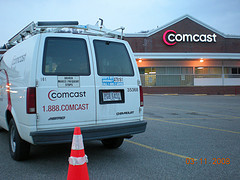Ad Watchdog Voices Concerns About Claims Made In Comcast, T-Mobile Commercials

(u2acro)
First up is the tiff between CenturyLink and Comcast. The smaller of the two cable/Internet providers took issue with claims made in recent ads for Comcast’s $99 triple-play cable/Web/phone bundle that claimed it offered the “fastest Internet” and speeds that were “up to 4X faster than CenturyLink.”
And so CenturyLink took its complaint to the National Advertising Division of the Council of Better Business Bureaus, which investigated the claims made in the Comcast ads to see if they were indeed accurate.
CenturyLink had alleged that the “fastest Internet” claim was misleading because it offers standalone Internet access tiers that are faster than what Comcast offers. But NAD concluded that because those speeds are only available to a fraction of CenturyLink customers, and are only available to stand-alone Internet service subscribers, and did not see any reason for Comcast to change that language.
NAD did, however, have a problem with Comcast’s failure to make clear in its ads that that the “fastest internet speed” offered as a point of comparison is not the speed of the Internet service offered as part of the Triple-Play package. Additionally, NAD concluded that Comcast could do a better job of communicating that the $99 price is merely introductory and that it will increase after the initial offer period.
Though Comcast maintains that the ads are clear about the speed of service included in the Triple-Play bundle, and NAD’s rulings are not legally binding, Comcast decided that, “as a respectful participant of the self-regulatory process will take NAD’s concerns with respect to the clarity of this price offer into consideration in formulating its future advertising.”
DEATH STAR ATTEMPTS TO SHOOT DOWN T-MOBILE CLAIMS
The second big NAD ruling this week involves a dispute between AT&T and T-Mobile over claims made by the latter in ads that implied AT&T’s network is overstretched and sluggish.
AT&T also wasn’t pleased with statements made by T-Mobile that it “has 50% more bandwidth than AT&T,” the “Most Advanced Technology,” “Faster 4G Service,”
and that it offers “coast to coast” 4G coverage, and “provides better call quality than AT&T.”
NAD investigated the “50% more bandwidth” statement and claims of less congestion. It found that T-Mobile had based these claims on download speeds available across the T-Mobile’s UMTS (Universal Mobile Telecommunications System), HSPA and HSPA+ network. Compared with AT&T’s UMTS, HSPA and HSPA+ network, NAD found that yes, T-Mobile was less prone to congestion. However, the T-Mobile ad did not compare speeds and congestion with AT&T’s newer 4G LTE network.
Thus, NAD recommended that T-Mobile drop its unqualified “more bandwidth,” “less congestion,” “most advanced technology,” and “Faster 4G Service” claims, or modify the claims to state the basis for comparison.
In T-Mobile’s defense, NAD concluded that it had provided enough evidence to substantiate its “Coast-to-Coast” coverage claims.
T-Mobile say it “will take into consideration the concerns NAD expressed with respect to the clarity of certain of these advertising claims in formulating its future advertising.”
Want more consumer news? Visit our parent organization, Consumer Reports, for the latest on scams, recalls, and other consumer issues.

